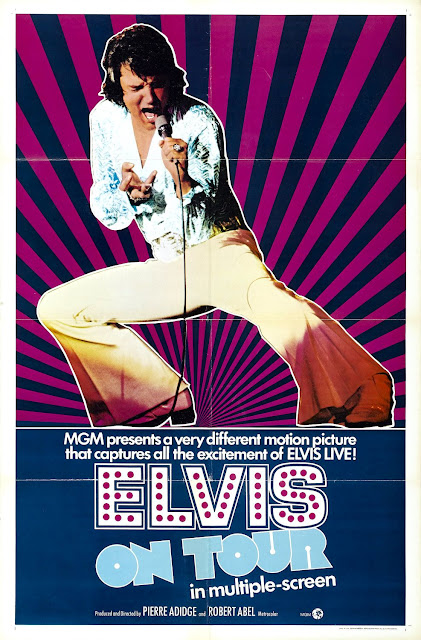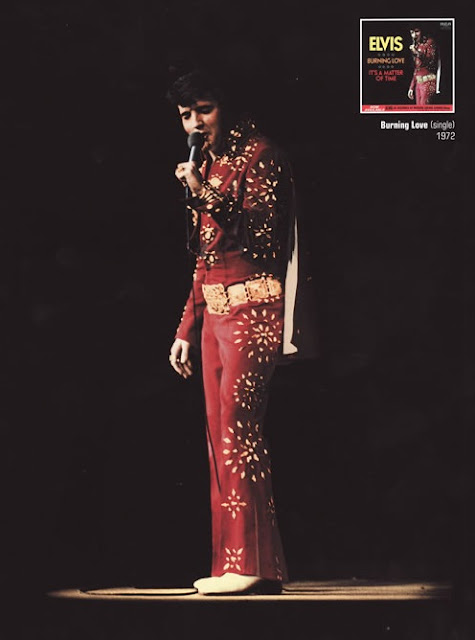When I was eleven (1981)
my Dad bought our first video recorder. It was a VHS top-loading Ferguson
Video-Star, with a ‘remote control’ handset that was attached to the machine
with a long cable. It came together with a free one hour blank video tape
which, since he’s also brought home a pack of three hour tapes, he gave to me.
Not long afterwards ‘Elvis On Tour’ was shown on TV. I forget the channel that
showed it, but it must have been BBC1 or BBC2 as there were no ad breaks. I sat
cross legged and real close to the TV for what seemed like ages waiting for the
film to start, my one hour tape in the machine and my fingers hovering above
the ‘play’ and ‘record’ buttons that had to be pushed simultaneously for
recording to begin.
“My Daddy had
seen a lot of people who played guitars and stuff and didn’t work. So he told
me, you should make up your mind about either playing guitar or being an
electrician…I never saw a guitar player who was worth a damn!” - EP, opening lines of Elvis On Tour.
I’d heard
Elvis before on the couple of LP’s my Dad owned and I’d seen a TV broadcast of ‘Aloha
From Hawaii’ that was shown on TV following his death on 16th August
1977 (sadly, my first Elvis memory is his death and the reports on radio and TV
that followed). But, since I was seven years old at the time, little remains in
my memory, other than The Aloha stage set and Elvis singing Hound Dog, which at
seven, was (rather predictably) my favourite Elvis record. I’d also seen a few
of his films from the mid 1960’s – they were always on TV to mark the
anniversary of his death – but I didn’t like them very much, the songs were
usually rubbish - An opinion I hold to this day.
So I’d stuck with his records
from then on and had accumulated a small collection of Elvis LP’s and 7” singles
that I’d either been bought as Christmas or Birthday presents or that I’d
managed to persuade someone to give to me. By the age of ten, I was getting
copies of ‘Elvis Monthly’ magazine regularly (My Mam had bought me membership
in the Official Elvis Presley Fan Club of Great Britain when I was nine, so I
also received the members only magazine TCE – Taking Care of Elvis)
and had read about Elvis On Tour and seen (usually the same dozen or so) photographs that the magazines were prone to use and re-use repeatedly for years. I became obsessed with it, looking through my little stack of Elvis magazines and Annuals for any information I could find and hoping that one day ‘On Tour’ would be shown on TV, instead of the likes of ‘Clambake’ or ‘Paradise Hawaiian Style’!


Looking back,
it’s hard to remember a time when finding photos and information on a musician
or a film was difficult, and even more so, actually being able to own them. So
that VHS machine was now going to record onto my prized one hour blank tape,
and I’d be able to watch and re-watch the film I’d waited so long to see. I can
still remember the huge anticipation, doubting that it could possibly live up
to my huge expectations.
It’s my
opinion that the April 1972 tour encapsulates everything that was great about
Elvis in the 1970’s. Fifteen cities in fifteen nights, sold out arenas and
thousands of fans on the point of uncontrolled hysteria coupled with some of
the definitive performances of his later stage repertoire.
Elvis was on top
form at this point in his career and it comes across magnificently in the three
concerts that form the main body of the films live footage. The Hampton Roads,
Greensboro and San Antonio concerts show Elvis at the summit of his ability as
a singer. Often unleashing magnificent, powerful vocal performances unequalled in
twentieth century popular music, his range is absolutely incredible.  Check out
his versions of ‘Bridge Over Troubled Water’ and ‘American Trilogy’ from
Greensboro 14 April 1972, both definitive versions that I would argue are
amongst the finest of his career
Check out
his versions of ‘Bridge Over Troubled Water’ and ‘American Trilogy’ from
Greensboro 14 April 1972, both definitive versions that I would argue are
amongst the finest of his career
 Check out
his versions of ‘Bridge Over Troubled Water’ and ‘American Trilogy’ from
Greensboro 14 April 1972, both definitive versions that I would argue are
amongst the finest of his career
Check out
his versions of ‘Bridge Over Troubled Water’ and ‘American Trilogy’ from
Greensboro 14 April 1972, both definitive versions that I would argue are
amongst the finest of his careerBut On Tour didn't just collect together some random live film and leave it at that. It also showed Elvis backstage, in the recording studio and travelling with the entourage.
Since Elvis was never over-exposed in the news media (he never gave
an in-depth interview in his life) and access to him had always been closely
guarded, what On Tour preserves is (at least in a small way) a glimpse into his
world of hotels, limos and a tour schedule that modern artists wouldn't ever
begin to match. Let’s not forget that at this point in his career, Elvis was
constantly performing. A punishing itinerary often (in Las Vegas especially) performing two and even three shows a day!

Unlike That’s The Way It Is, filmed in July and
August 1970 in Las Vegas, On Tour is Elvis unleashed from the confines of the
Hilton Hotel in Vegas and let loose on the road, something that is evident in
his On Tour performances - They explode with energy and confidence.
An hour into
the films TV broadcast the tape stopped and started to auto rewind as if to rub
salt into a wound. I was devastated. It would be another year before I’d see ‘Trilogy’
onwards and that would more than make up for this mishap with the tape length
as I got to see ‘On Tour’, along with ‘That’s The Way It Is’, on the big
screen, when the Tyneside Cinema in Newcastle upon Tyne, started having Elvis
movie screenings on Saturday afternoons. (I even got a discount on the ticket
price as Fan Club members got in cheaper). Happy days!

Since that
first viewing, over thirty years ago, Elvis On Tour remains my favourite of his
films and I have seen it around 150 times (I did say I was obsessed!). I now
own it on Blu-ray, and whilst that edition has its flaws (The opening of Johnny
B Goode has been replaced by Don’t Be Cruel because of Chuck Berry and his refusal
to let it be used on the Blu-ray release), the print isn’t exactly marvellous
and there are no extras, despite many hours of material existing on the
underground bootleg collectors market.
My ‘On Tour’
quest isn’t over yet. Who knows, one day I may see a deluxe version released,
not unlike the ‘TTWII’ special edition DVD and the ‘Aloha’ and ‘Comeback’
deluxe DVD releases from several years back. One day…one day.

























